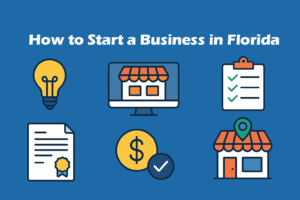Starting a business in Colorado involves thoughtful planning, legal registration, funding decisions, and market preparation. Colorado is known for its supportive startup ecosystem, affordable filing fees, and access to both traditional and innovative financing options. Here’s a step-by-step guide that covers the most important aspects every entrepreneur should know.
Choose a Business Idea
The first step in starting a business is selecting the right idea. Entrepreneurs should choose something that matches their skills, interests, and market demand. In Colorado, industries like technology, outdoor recreation, food services, and renewable energy continue to see strong growth. Conducting market research helps identify customer needs, competition, and potential profitability.
Example: A Denver-based entrepreneur might notice limited options for healthy dessert cafés and launch a shop to fill that demand. Meanwhile, someone in Boulder could open a hiking gear rental business to cater to the state’s large outdoor tourism market.
Name Your Business
Choosing a name is more than a creative step – it also involves compliance and availability checks. Entrepreneurs must search the Colorado Secretary of State’s Business Database to ensure the name isn’t already in use. Depending on the business structure, certain words are required, such as “LLC” for limited liability companies or “Inc.” for corporations. For those not ready to file immediately, Colorado allows name reservations for $25, holding the name for 120 days.
Beyond legal requirements, branding is key. Owners should secure matching domain names and social media handles to build a strong online presence. If expansion beyond Colorado is in the long-term plan, checking trademarks through the United States Patent and Trademark Office (USPTO) ensures broader protection. Many successful Colorado businesses also incorporate local references in their names, such as “Rocky Mountain Roofing” or “Boulder Brew Co.,” to connect with community identity.
Explore Your Funding Options
Securing funding is a crucial step in launching a business. Many entrepreneurs in Colorado begin with traditional financing such as bank loans, credit unions, or SBA-backed loans. At the state level, the Colorado Office of Economic Development and International Trade (OEDIT) provides grants and accelerator programs for industries like technology, aerospace, and bioscience, helping startups gain both capital and credibility.
Colorado also has a strong investment network. Angel investors and venture capital firms in Denver and Boulder, such as Rockies Venture Club and Access Venture Partners, actively support early-stage businesses. Crowdfunding platforms like Kickstarter have proven effective for product-based ventures, while rural entrepreneurs may benefit from microloans through the Colorado Enterprise Fund. Example: A Boulder eco-friendly apparel startup combined an SBA microloan with an OEDIT innovation grant to reduce debt and attract investor attention.
Business Structure
Choosing the right legal structure determines liability, taxes, and growth opportunities. Colorado offers three common options:
| Business Structure | Fees (Colorado, 2024–25) | Key Details |
| Sole Proprietorship | Trade name registration: $20 (if using a DBA) | Simple setup, no state filing required. Owner has full liability. Income taxed on personal return. |
| LLC (Limited Liability Company) | Formation: $50Annual Report: $25 | Liability protection. Pass-through taxation (or elect S-Corp). Flexible and popular for small businesses. |
| Corporation (C-Corp / S-Corp) | Formation: $50Annual Report: $25 | Strong liability protection. More formal rules. C-Corp = double tax, S-Corp = pass-through. Best for investors. |
Example: A Denver tech startup began as an LLC to stay flexible and later converted into a C-Corp to issue shares and attract venture capital.
Registered Agent
Every LLC or corporation in Colorado must appoint a registered agent with a physical address in the state. The agent’s role is to receive official documents, legal notices, and tax forms on behalf of the business. Owners can serve as their own registered agent, but many choose professional services to maintain privacy and ensure availability during business hours.
Register an Employer Identification Number (EIN)
An Employer Identification Number (EIN), also called a Federal Tax ID, is issued by the Internal Revenue Service (IRS) free of charge. It is required for businesses that hire employees, open bank accounts, or file certain federal taxes. Even sole proprietors often benefit from having an EIN to separate personal and business finances. Applications can be completed online in just minutes.
Business Tax Credits
Colorado offers several tax credits and incentives to support business growth. These include the Enterprise Zone Tax Credit for companies operating in designated economic zones, the Job Growth Incentive Tax Credit for businesses creating new jobs with above-average wages, and the Advanced Industry Investment Tax Credit for startups attracting third-party investment.
Example: A Pueblo-based tech firm located in an enterprise zone qualified for both R&D tax credits and job growth incentives, reducing its tax burden while reinvesting savings into expansion.
For a deeper dive into tax strategies and incentives, you can explore resources like Finance Genetics, which provides insights into financial planning for entrepreneurs.
Understand Financial Considerations
Financial planning is essential to long-term success. Entrepreneurs must account for ongoing costs such as rent, payroll, insurance, taxes, and permits. Colorado imposes a flat state income tax rate of 4.55% on taxable income, and businesses may also need to collect sales tax depending on their industry. Accurate bookkeeping is crucial, and many owners benefit from professional accounting services.
For additional strategies on managing business finances effectively, check out the guides at Finance Genetics, which cover budgeting, credit management, and long-term planning for startups.
The Colorado Secretary of State’s Business Checklist also provides step-by-step guidance for managing compliance and financial obligations.
Market Your Business
Marketing ensures that customers know a business exists. Strategies often include building a strong brand, creating a professional website, and leveraging social media. Local networking through chambers of commerce and community events can also help build trust and attract early customers. Many Colorado businesses combine traditional marketing with digital advertising to maximize reach.
Example: A Denver bakery gained traction by combining Instagram marketing with farmers market pop-ups, later expanding its reach through food delivery apps.
Conclusion
Starting a business in Colorado involves selecting a viable idea, registering under the right structure, securing funding, and complying with tax and legal obligations. With relatively low filing fees, supportive state programs, and a thriving entrepreneurial ecosystem, Colorado offers a strong environment for new ventures. By carefully planning finances, leveraging incentives, and marketing effectively, entrepreneurs can set their businesses up for long-term success in the Centennial State.







